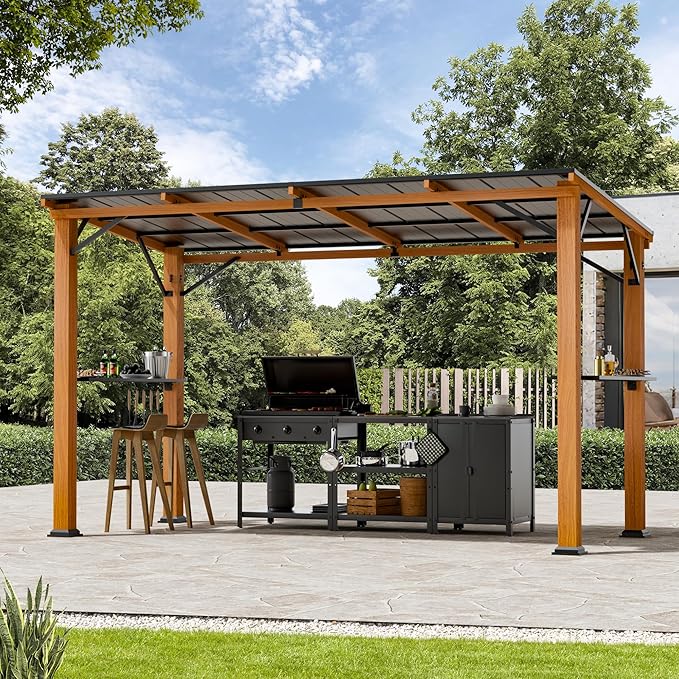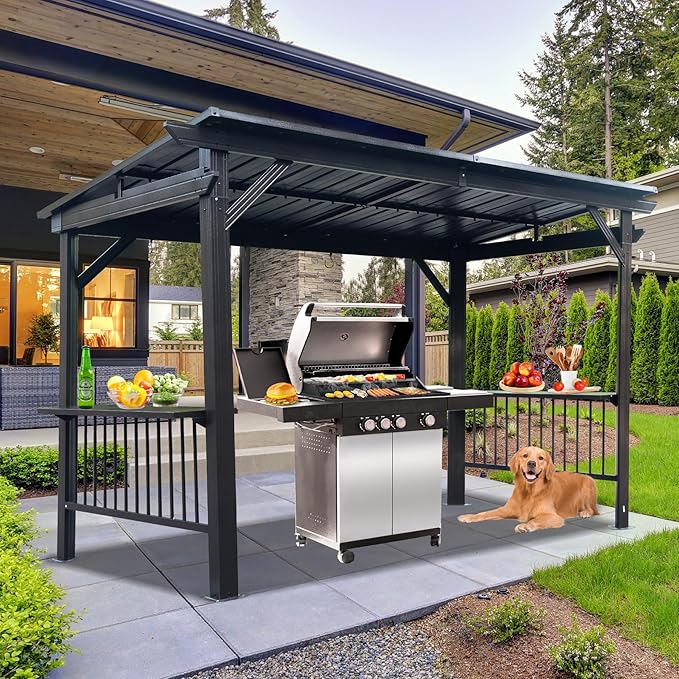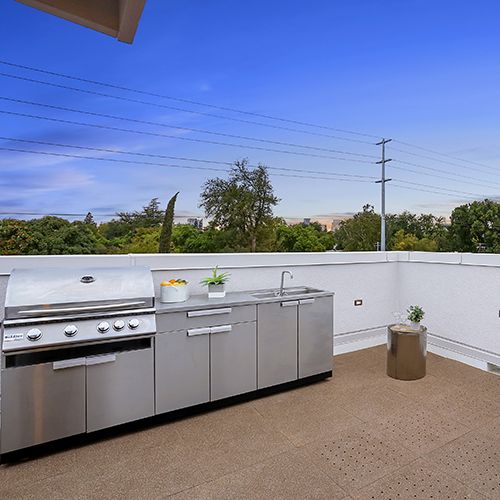The cold season is coming, and that means less time for outdoor grilling. Before you roll your grill into the corner of your patio, it’s smart to give it the attention it deserves. A few simple steps now can save you from rusted parts, clogged burners, and unwanted surprises next spring. Most grill owners don’t realize how much damage winter moisture can do until it’s too late.
Preparing and protecting your gas grill for winter means cleaning it thoroughly, drying every part, checking connections, and storing it in a safe, dry place with a proper cover. These actions prevent corrosion, extend your grill’s life, and make sure it’s ready to fire up again once warm weather returns.
You’ve spent the whole summer grilling delicious food. Don’t let all that effort go to waste. With the right care, your gas grill will last for years and perform like new every season. Let’s go step by step.
Why should you clean your gas grill before winter storage?
Cleaning your grill before winter is not just about looks. Food grease, carbon buildup, and moisture can damage metal parts during long storage. When you clean properly, you stop mold and rust from forming and keep your grill safe for next season.
A deep clean before winter protects your grill from rust, mold, and bad odors, while making your next cookout easier and safer. It also saves time when you take it out in spring, since it’s already clean and ready to use.
How to clean effectively
Start by removing the grates and burners. Use a stiff wire brush to scrub off any food debris. For stubborn spots, soak grates in a mix of warm water, dish soap, and baking soda for an hour. Rinse them well and dry completely before putting them back. Use a damp cloth with mild detergent to wipe the inside of the grill body and lid.
| Step | Task | Tools Needed |
|---|---|---|
| 1 | Brush grates and burners | Grill brush |
| 2 | Soak dirty parts | Baking soda, dish soap, warm water |
| 3 | Wipe inside and outside | Damp cloth |
| 4 | Dry completely | Clean towel |
A clean grill also keeps insects away during storage. Never use harsh chemicals or bleach, as they can damage the metal and leave toxic residues.

What steps should you follow to deep-clean the burners and grates?
Burners and grates are where most buildup happens. Cleaning them right prevents uneven flames, poor heat, and flare-ups later.
To deep-clean burners and grates, remove them, scrub off grease with a brush, rinse with warm soapy water, and dry fully before reassembling. This keeps airflow smooth and gas lines safe.
Step-by-step guide
- Disconnect the propane tank or gas line.
- Take off the grates, heat plates, and burners.
- Scrub the burners gently with a soft brush to clear out clogs.
- Use a thin wire or paper clip to open blocked gas holes.
- Rinse all metal parts in warm water and dry completely.
| Part | Cleaning Method | Frequency |
|---|---|---|
| Grates | Scrub with baking soda paste | Every season |
| Burners | Brush gently, unclog holes | Every 3 months |
| Flame tamers | Wipe and rinse | After heavy use |
Keep in mind that leftover moisture inside the burners can freeze in winter, leading to cracks or rust. Always dry them before reassembly. Once dry, coat the grates lightly with cooking oil to prevent corrosion.

How can you prevent rust and corrosion during grill hibernation?
Metal hates moisture, and winter air is full of it. When water sits on your grill’s surface, it creates rust that eats through the metal.
Prevent rust by cleaning your grill, applying a thin coat of oil to metal parts, and covering it tightly with a weatherproof grill cover. Avoid leaving the grill uncovered in snow or rain.
Protective coating methods
A light coating of high-heat oil like canola or avocado oil keeps oxygen from reaching the metal. This forms a natural barrier against rust. Some people also use food-grade silicone spray on stainless steel areas for extra protection.
| Protection Type | Material Used | Suitable For |
|---|---|---|
| Oil coating | Canola or avocado oil | Iron and steel |
| Silicone spray | Food-grade silicone | Stainless steel |
| Cover protection | Waterproof nylon or PVC | Entire grill |
Avoid plastic covers that trap moisture. Use breathable fabric covers that repel water but allow air to circulate. Always cover the grill only after it’s fully dry.

Where is the best place to store your grill and propane tank?
Storage location matters more than most people think. Cold and wet conditions can harm both your grill and fuel.
Keep your grill in a dry, covered outdoor area or a ventilated shed, and store propane tanks outdoors away from direct sunlight and heat. Never store propane indoors for safety reasons.
Safe storage options
If you have a garage or shed, make sure there’s enough airflow to prevent gas buildup. For built-in outdoor kitchens, cover the grill structure and seal gas connections with caps. For small portable grills, storing them in a dry basement is acceptable—only if the propane tank is removed.
| Storage Option | Pros | Cons |
|---|---|---|
| Covered patio | Good airflow, easy access | May still get damp |
| Shed or garage | Protection from weather | Must ensure ventilation |
| Storage cover only | Affordable, simple | Less temperature control |
Detach the propane tank, check for leaks, and place it upright in a safe outdoor corner. A shaded area with a roof or overhang is ideal.
What kind of cover or shelter does your grill need in winter?
A cover is your grill’s best defense against snow and moisture. Without it, corrosion happens fast.
Choose a heavy-duty, waterproof grill cover that fits snugly, resists UV damage, and prevents water from seeping in. Always secure it properly to avoid wind damage.
Choosing the right cover
When buying a cover, look for weatherproof nylon or polyester with PVC backing. It should have straps or drawstrings to stay tight during windy conditions. Breathable fabrics prevent condensation, while thick materials protect from sharp ice or falling debris.
| Feature | Why It Matters |
|---|---|
| Waterproof | Keeps snow and rain out |
| UV resistant | Prevents fading and cracking |
| Adjustable straps | Holds cover tightly in wind |
| Ventilation flaps | Reduces trapped moisture |
Avoid leaving your grill uncovered, even for short periods, during the cold months. A small tear in the cover should be repaired immediately to keep protection effective.
When should you disconnect or remove accessories and fuel lines?
Leaving your gas lines or attachments connected during winter is risky. Temperature changes can cause seals to dry or crack.
Disconnect fuel lines, side burners, and accessories before storage to prevent leaks, cracks, or rodent damage. Always check for gas smells before reattaching next season.
How to disconnect safely
- Turn off the gas supply completely.
- Unscrew the regulator and hoses gently.
- Check for cracks in rubber parts.
- Cap the openings to prevent insects or dust.
- Store detachable accessories indoors if possible.
Inspect hoses for wear or corrosion before reusing. Replace anything that looks old or brittle. Keeping your connections clean also prevents clogging and uneven flame output.
How can you check and maintain your grill during the off-season?
Even while in storage, your grill benefits from occasional checks. A short look every few weeks prevents small issues from growing.
Inspect your grill monthly for signs of rust, insects, or moisture under the cover. Reapply oil if needed and clean off any water spots. Small actions now keep your grill ready for spring.
Off-season maintenance schedule
| Month | Task | Notes |
|---|---|---|
| December | Check for moisture | Wipe dry if needed |
| January | Re-oil metal parts | Prevent rust buildup |
| February | Inspect hoses | Replace cracked parts |
| March | Pre-season test | Reconnect gas, test ignition |
Look inside for nests or debris. Rodents often crawl into unused grills. A simple wire mesh can block entry points. Regular checks mean less work when grilling season returns.
What common storage mistakes shorten the life of a gas grill?
Most grill owners lose years of service life due to avoidable mistakes. Forgetting to clean or leaving propane tanks attached are the biggest culprits.
Common mistakes include storing a wet grill, leaving the gas connected, skipping oil coating, and using the wrong type of cover. These lead to rust, leaks, and unsafe conditions.
Frequent mistakes and fixes
| Mistake | Problem | Solution |
|---|---|---|
| Storing grill wet | Rust, corrosion | Dry completely before covering |
| Leaving propane connected | Safety hazard | Disconnect and store separately |
| Using thin or plastic cover | Moisture trapped | Use thick, breathable cover |
| Not cleaning before storage | Mold, bad smell | Deep clean and oil before covering |
Avoid piling heavy items on top of your grill cover, which can tear it. Check all screws and handles to ensure they stay tight after winter.
Conclusion
Taking care of your gas grill before winter is simple, but it makes a big difference. A clean, dry, and protected grill will last longer, cook better, and stay safe. Follow the basic steps—clean, dry, oil, cover, and store properly—and your grill will be ready to perform perfectly next summer. Treat your grill like a long-term investment, not just a summer tool, and it will reward you with many seasons of great meals.
Frequently Asked Questions (FAQ)
How long can I leave my gas grill unused before rust appears?
If left uncleaned and exposed to moisture, rust can start forming within a few weeks of storage. An early cleaning improves protection. (BBQ Guys)
Is it safe to store the propane tank indoors during winter?
No. A propane tank should always remain outdoors, upright and in a ventilated area. Storing it indoors poses a serious hazard. (Boehlke Bottled Gas)
Do I need to run my gas grill on high before winterizing it?
Yes. Running the grill on high for about 10-20 minutes helps burn off food residue and prevents mold and pests during storage. (Breakaway)
What type of cover is best for winter storage of a gas grill?
A heavy-duty, waterproof but breathable cover that fits snugly and has straps or drawstrings offers the best protection against moisture and weather. (Self Storage Plus)
Can I leave the grill in a garage over winter if I cover it?
You can store the grill in a garage if well-ventilated and dry, but always keep the propane tank outdoors. The tank interior remains a safety risk. (Weber)
How often should I check the grill during winter storage?
It’s wise to inspect your grill roughly every month for signs of moisture, pests, or rust. Quick checks reduce bigger problems later. (BBQ Guys)
Does leaving food residue really attract pests or mold while the grill is stored?
Yes. Food residue and grease inside a dormant grill attract insects or rodents, and can promote mold growth in mild conditions. (Weber)
Should I oil my grill grates before storing it for winter?
Applying a thin layer of food-safe oil to grates and burners protects metal parts by forming a barrier against moisture, which helps prevent rust. (BBQ Guys)
